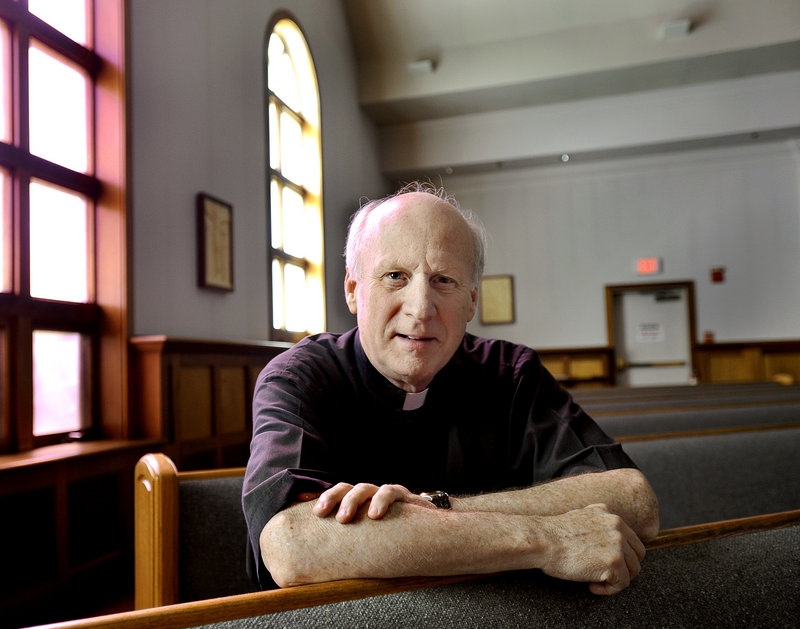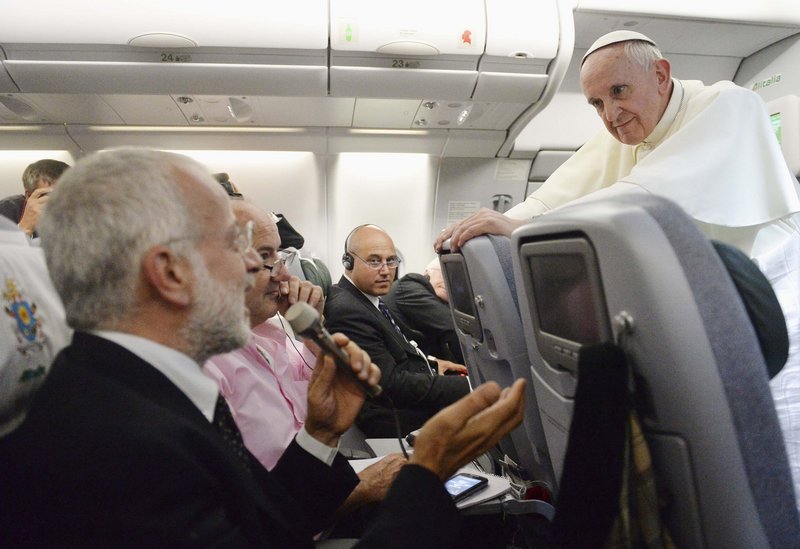Catholic leaders, parishioners and gay-rights activists in Maine welcomed Monday’s comments by Pope Francis that homosexuals, including gay priests, should be accepted and not judged by the church or society.
Some scholars and activists interpreted the pope’s comments to reporters Monday as a softening of the church’s stance against same-sex relationships.
But his comments were viewed by at least some in Maine as consistent with Catholicism’s long-held opinion that homosexual orientation is fine as long as it’s not acted upon.
“I don’t see anything new there at all,” said Msgr. Michael Henchal, vicar general of the Roman Catholic Diocese of Portland. “This is what the church has been saying for decades.”
Francis’ comments drew a strong and swift reaction in Maine.
Some gay-rights activists, such as EqualityMaine Executive Director Betsy Smith, interpreted them as a sign that the church is moving in the direction of recognizing individual rights of lesbians, gays, bisexuals and transgender people.
“EqualityMaine celebrates this step forward from the pope and the Catholic church,” Smith said. “We look forward to a day when all faiths will celebrate and welcome LGBT people without exception, and this shift from the Catholic church is a small but important step toward that future.”
Smith said Catholics in Maine have struggled to reconcile church doctrine regarding homosexuality with their personal feelings toward people they know who are in same-sex relationships.
“What we’ve seen is that, as Catholics and people of many other faiths get to know their LGBT friends, neighbors and family members, they realize their faith calls on them to treat all people with the dignity, respect and love they would want for themselves,” she said.
Bishop Richard Malone of the Roman Catholic Diocese of Portland did not return calls or emails left with a church spokesman seeking comment.
Stephen Pope, professor of theology at Boston College, said Francis’ comments were consistent with his other efforts to address declining church membership by reaching out to a more diverse audience.
That approach stands in stark contrast to that of his predecessor, Pope Benedict XVI, he said.
“I think Pope Benedict’s philosophy was to say, ‘Let them go. We’ll have a smaller church but more pure,’ ” Pope said. “Pope Francis has sort of adopted this strategy of meeting people where they are and looking for commonality.”
Henchal agreed that Francis has a knack for being upbeat and inclusive.
“The packaging is different,” Henchal said. “He said this in a very positive and productive way.”
Still, he noted that the pope was calling Monday for public acceptance of homosexual orientation, and that he never contradicted the church’s stance against physical expressions of same-sex attraction.
“That doesn’t change anything about what the church has to say about the immorality of homosexual genital actions,” Henchal said.
Likewise, the pope’s comments should not be misinterpreted as an endorsement of gay marriage, he said.
“That’s a different story,” Henchal said. “He wasn’t talking about marriage.”
Henchal said the Catholic church in Maine has not objected to any gay-rights legislation except for the state’s same-sex marriage law, approved by voters in November.
Parishioners who attended Monday’s 12:15 p.m. Mass at the Cathedral of the Immaculate Conception in Portland said they agree with the pope’s comments but do not see them as a departure from the church’s policy toward gays and lesbians.
“I don’t think we’ve ever had anything against homosexuals,” said Ashley Ross, 21, of South Portland. “(Acceptance by the Catholic church) doesn’t have anything to do with being gay or being straight.”
Because Francis’ comments were disseminated only in isolated quotes and sound bites through the media, it’s hard to know exactly what message he intended to convey, said Gary Johnson, associate professor of history at the University of Southern Maine.
“I think it’s really tough to understand precisely what he’s saying or precisely what he means,” he said.
Johnson said it’s not surprising that the subject of homosexuality came up at the news conference, given that the media has been pursuing stories about alleged sexual indiscretions within the Vatican.
As long as Francis stops short of condoning same-sex relationships, there is little reason to believe the church will change its official position toward gays, Johnson said.
“If sexual contact remains wrong,” he said, “then there’s not much of a shift.”
— Staff Writer Eric Russell contributed to this report.
J. Craig Anderson can be contacted at 791-6390 or at:
canderson@pressherald.com
Twitter: @jcraiganderson
Send questions/comments to the editors.





Comments are no longer available on this story